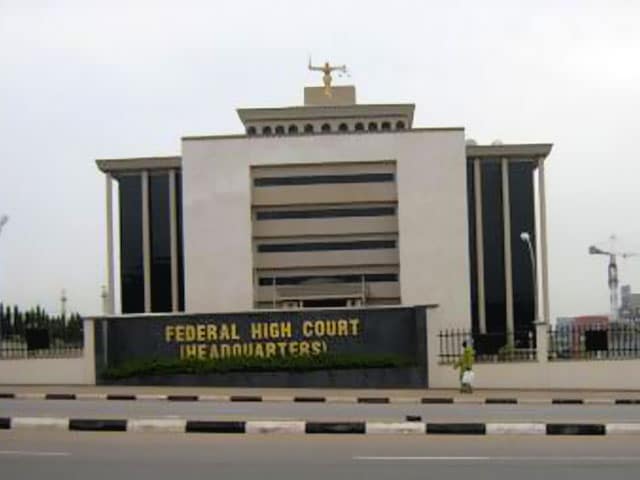Poll sequence: Court stops NASS from overriding Buhari

.No, we have power over elections sequence, veto President – Reps
.Okay removal of S138, 152 in conflict with Constitution
.To regazette Electoral Act, transmit bill to President for accent
Justice Ahmed Mohammed of the Federal High Court in Abuja on Wednesday restrained the National Assembly from taking any further action on the Electoral Amendment Bill, 2018 till Tuesday next week when a suit filed by Accord Party will be determined.
Justice Mohammed, who granted the preservative order specifically ordered “the defendants to maintain status quo ante belum pending the next adjourned date on Tuesday, March 20, 2018.
Justice Mohammed gave the order while delivering ruling on an oral application for preservative order moved by the lawyer to Accord Party (the plaintiff), Chief Wole Olanipekun (SAN), seeking the court’s intervention on the matter.
The judge ruled that there was the need to preserve the res (the subject matter) of the case
In his ruling on the matter, Justice Ahmed said, “In view of the provisions of section 58, subsection 5 of the 1999 Constitution which empowers the National Assembly to veto the president withholding of his assent by a two-thirds majority votes, the court is simply to preserve the res in order to safeguard the integrity of the court and the sanctity of the judiciary under section 6 (6) of the 1999 Constitution.
“The parties are therefore ordered to maintain status quo ante belum between now and the next adjourned date. Hearing notice is to be served on the second defendant (the Attorney General of the Federation AGF) who is absent in court.”
In the motion filed pursuant to order 26, rules 1, 2 & 3 and order 18, rule 1 of the Federal High Court, Accord Party is seeking for an interlocutory injunction restraining the President of the Federal Republic of Nigeria from assenting to the Electoral Act amendment bill 2018 as passed by the National Assembly, pending the final determination of the substantive originating summons.
Secondly, the plaintiff had sought a further order of interlocutory injunction restraining the National Assembly from taking any further action or actions on the bill titled, ‘Electoral Act amendment bill 2018, particularly, to convene to pass the said bill by two-thirds majority of each of its two Chambers, pending the final determination of the substantive originating summons.
In the Originating Summons marked FHC/ABJ/CS/232/2018, the plaintiff raised eight issues for determination by the court, thus: Having regards to the combined provisions of sections 79,116,118,132,153,160(1) and 178 of the 1999 Constitution (as amended), the constitution read together with paragraph 15(a) of the third schedule to the same constitution, whether the Independent National Electoral Commission (the third defendant) is not the only institution or body constitutionally vested with the powers and vires to organise, undertake and supervise elections to the offices of the president, the vice president of the Federal Republic of Nigeria, the Governor and deputy governor of a state, the membership of the Senate, the House of Representatives and the House of Assembly of each state of the federation, including fixing the sequence and dates of the elections to the said offices?
“That considering the combined provisions of sections 79,116,118,132,153,160(1) and 178 of the 1999 constitution as amended, the constitution read together with paragraph 15(a) of the third schedule to the same constitution, whether the National Assembly possesses the powers and vires to propose any bill or pass any bill into an Act which directs or purport to direct, mandates, or purport to mandate, dictates or purport to dictate to the 3rd defendant to follow a particular sequence in the organisation and conduct of elections to the offices of President and vice president, the Governor and deputy governor of a state, the membership of the Senate, the House of Representatives and the House of Assembly of each state of the federation?
“Whether having regard to the exercise by INEC of its powers and in furtherance of its function and duty to organise, undertake and supervise all elections to the offices of the
President and vice president, the Governor and deputy governor of a state, the membership of the Senate, the House of Representatives and the House of Assembly of each state of the federation, as prescribed by sections 76(1), 116(1), 132(1), 153(1)(f) and 178(1) and sections 25 and 30 of the Electoral Act, 2010 and having come out with or announced a schedule or timetable for 2019 general election, the National Assembly can later make a law to re-order, or prescribe a schedule inconsistent with the schedule or order earlier on made by INEC under legislation which were at the time of the exercise valid and extant.
The plantiff further asked for a declaration that INEC is the only body and or institution constitutionally vested with the powers, vires and duties to organise, undertake and supervise elections to the offices of the President and vice president, the Governor and deputy governor of a state, the membership of the Senate, the House of Representatives and the House of Assembly of each state of the federation, including fixing or assigning dates for the said elections and the sequence of same.
The plaintiff is therefore asking the court for an Order setting aside clause 25 of the Electoral Amendment Bill, 2018;
An order of perpetual injunction restraining: The President of the Fedral Republic of Nigeria, represented by the second defendant, from assenting to the Electoral Act amendment bill, 2018 as passed by the first defendant;
The first defendant from passing into law, by a two thirds-majority, or any majority at all the said bill as already passed by it.
When the case was mentioned, lawyer to Accord Party, Olanipekun (SAN) told the court that the defendants were served with the Originating summons on March 12, 2018 and as such prepared to go ahead with their argument.
But the lawyer to the National Assembly , Chinelu Ogbazor, argued that the motion was not ripe for hearing, going by the rules of the court that requires a time frame of 48 hours after service before it can be heard.
She added that her client is entitled to 7 days within which it can respond to any motion, and with the permission of the court would be asking for a short adjournment to prepare the reply of her client to the motion.
But the lawyer to INEC, Taminu Inuwa, did not oppose to the hearing of the motion.
Responding to the request for an adjournment, Olanipekun however noted that the plaintiff would not be opposing the request if Ogbazor would give an undertaken that her client (National Assembly) would not take any action that would affect the res of the litigation until the determination of the matter.
But Ogbazor said he could not enter into any undertaken to stop National Assembly from performing its constitutional primary function to make law.
She stressed that the time given by law to respond to the motion has not even elapsed, adding that INEC was served with the court process less than 48 hours ago.
Her refusal prompted Olanipekun to move an oral application for a preservative order.
The senior advocate contended that following the refusal of the president to assent to the bill, the National Assembly with the powers vested in it can go ahead and override the president’s assent and thereby passing the bill into law while the matter is pending.
Further hearing on the matter has been adjourned to March 20.
Meanwhile, the House of Representatives has insisted that it is constitutionally empowered to legislate on the sequence of elections to be conducted by INEC and has resolved to expunge areas contained in the amended Electoral Act which President Muhammadu Buhari refused to assent to that are in conflict with the 1999 Constitution (as amended).
Similarly, the House announced that it will override the president’s veto of the Nigerian Peace Corps bill and nine others.
Chairman, House Committee on Media and Public Affairs, Hon Abdulrazak Namdas, who made the declaration on Wednesday at a press briefing, said that the House agreed with two of the reasons adduced by the president in withholding assent to the Electoral Act.
Hon Namdas asserted however that the House faults the first reason given by the president, adding that based on the development, the House will expunge the areas that are in conflict with the constitution, regazette the bill, pass it and forward it to the President for assent.
Specifically, he said the House is in agreement with Buhari that it lacks powers to amend Sections 138 and 152 (3-5) of the extant Act, but objects to the claim that the National Assembly lacks power to tamper with the discretionary powers granted INEC to conduct elections.
According to him, Section 4 of the constitution empowers the National Assembly to legislate on elections into the offices of the president, Vice President, Senate House of Representatives, governor and state deputy governor with the exception of the office of local government chairman.
He said, “Again, Section 76 of the constitution states that the INEC has powers to fix dates of elections in accordance with Electoral Act.
“Our argument is that if the National Assembly has no powers to legislate on elections timetable, then it has no powers to pass the Electoral Act in the first instance.
“You’ll recall that the Supreme Court voided the introduction of the card reader initially because it wasn’t backed by legislation.
“In view of these, we’ll regazette the Act and expunge the areas we’re in agreement with the president, pass it through first, second and third reading and retransmit it back to the president for assent.”
The lawmaker was however silent on what step the House will take in the event Buhari again withholds his assent to the amendment, adding that “the House believes the president will see with the reasons we’ve given and the president will also agree with us when we retransmit the amended Electoral Act.
“However, we’ll cross the bridge when we get there,” he added.
Namdas further disclosed plans by the House to override Buhari’s veto of 10 bills, including the bill establishing the Nigerian Peace Corps.
The other bills include the Chartered Institute of Management, Nigerian Council on Social Works, currency conversion, police procurement fund, environmental health registration council, Chartered Institute of Loan and Risk Management, Institute of Public Management, Chartered Institute of Commodity Brokers and the bill establishing the Federal University, Wukari.







